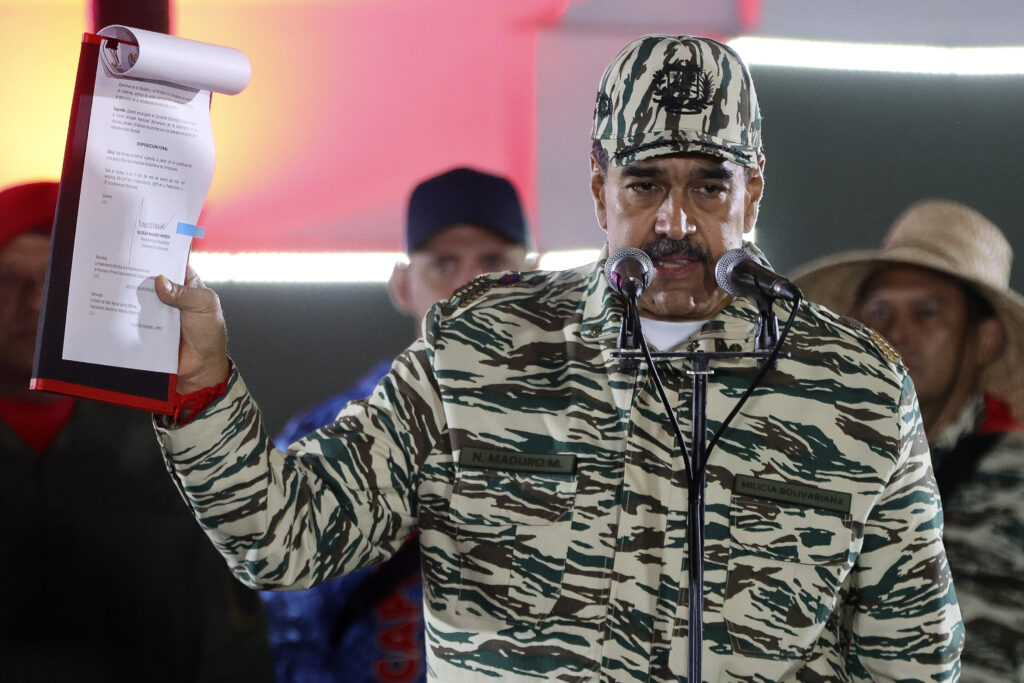Venezuela is on tenterhooks as it braces for pro- and anti-government protests Thursday — the eve of President Nicolas Maduro’s swearing-in for a third term rejected by the opposition and much of the international community as illegitimate.With exiled opposition figure Edmundo Gonzalez Urrutia vowing to return home to claim the presidency he insists he won in elections last July, his supporters have been called to turn out in millions ahead of Friday’s investiture ceremony.But backers of Maduro’s ruling “Chavista” movement have vowed to take to the streets as well, and thousands of heavily-armed police and soldiers have been deployed in Caracas in advance.Interior Minister Diosdado Cabello has said anti-Maduro protesters, whom he described as “fascists” and “terrorists,” “will regret” turning out, vowing that “we will go on the counter-attack.”A brutal crackdown on the protests that met Maduro’s election victory claim five months ago saw 28 people killed, some 200 injured and more than 2,400 arrested. “What will happen is unpredictable,” Venezuelan Mailin Rodriguez told AFP on the streets of Caracas Tuesday. “I don’t know if what will happen will be good or bad.”Amid the rising tension, Gonzalez Urrutia was winding down an international tour that has taken him to Argentina, Uruguay and the United States — where he received strong support Monday from President Joe Biden.He is headed next to Panama, where he will meet former Latin American presidents and a dozen current foreign ministers Wednesday as part of a campaign to drum up pressure on Maduro to step aside.”Edmundo Gonzalez Urrutia’s strategy is to give impetus to the opposition cause and assume a leading role in trying to increase international pressure,” Mariano de Alba, a Venezuelan expert in international relations, told AFP. As for his vow to take power on Friday? “Unlikely,” said de Alba. Authorities in Caracas have vowed to arrest Gonzalez Urrutia, who was granted exile in Spain last September, if he returns to the country.Several of the ex-presidents he is due to meet Wednesday have announced they intend to fly with Gonzalez Urrutia to Caracas to assume office. They did not explain how such a trip would unfold.”That aircraft, those crew members, the crew and passengers must be treated as a foreign force trying to invade,” Parliamentary speaker Jorge Rodriguez warned this week.- ‘Historic day’ -Opposition leader Maria Corina Machado, whom Gonzalez Urrutia replaced as presidential candidate at the last minute after she was barred by the authorities from running, has said she will come out of hiding to join protesters Thursday.Her exact whereabouts have not been made public to avoid Maduro supporters gathering in the same place.”I will not miss this historic day for anything,” Machado told AFP Monday.The opposition says its own tally of polling station election results show that Gonzalez Urrutia had won hands down.But the country’s electoral council, loyal to the regime, handed the win to Maduro without releasing a vote breakdown.His claim to victory is not recognized by the United States, European Union and numerous other countries, including many in Latin America.All eyes are on US President-elect Donald Trump to see whether he will adopt new punitive measures against the oil-rich Caribbean country, as he had done in his first term.- ‘Hooded men’ -Gonzalez Urrutia, who had urged Venezuela’s armed forces over the weekend to recognize him as the legitimately-elected “commander-in-chief,” had his plea firmly rebuffed Monday by the country’s defense minister.On Tuesday, the opposition leader, 75, said his son-in-law had been snatched by “hooded men.”Machado, for her part, accused “agents of the regime” of surrounding her 84-year-old mother’s house, flying drones overhead and cutting power to the neighborhood.Maduro meanwhile on Tuesday announced the arrest of seven “mercenaries” — two Americans, two Colombians and three Ukrainians. The president has frequently made allegations of US-led attacks to unseat him.”The government has had to rely more and more on the Armed Forces and the police to stay in power,” Phil Gunson, of the International Crisis Group think tank, told AFP.”Since July 28, that dependency has become more evident, and from January 10 onwards it will deepen.”
Wed, 08 Jan 2025 05:42:10 GMT
